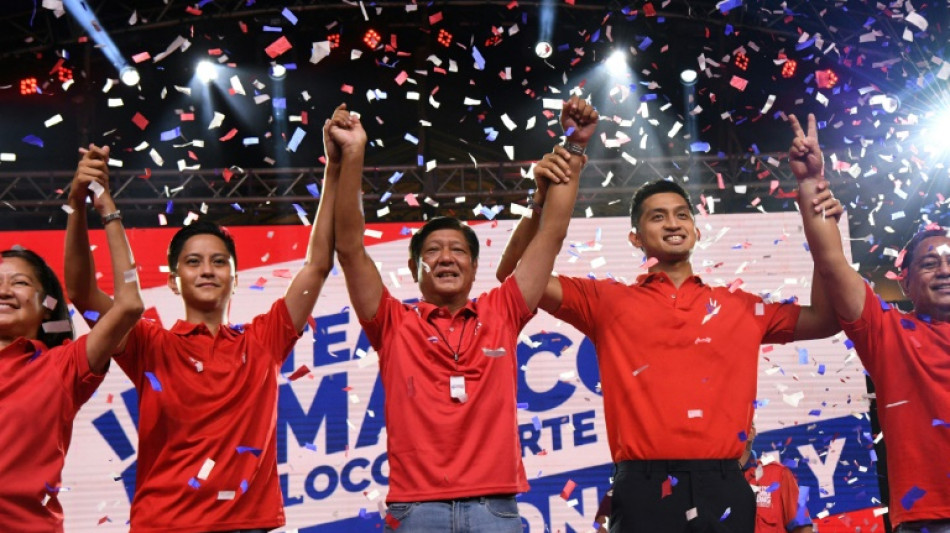
-
 Hamas says open to 5-year Gaza truce, one-time hostages release
Hamas says open to 5-year Gaza truce, one-time hostages release
-
Iran, US hold new round of high-stakes nuclear talks

-
 Up at dawn for front-row seat to history at Francis's funeral
Up at dawn for front-row seat to history at Francis's funeral
-
Pakistan ready to 'defend sovereignty' after India threats

-
 Huge crowds flock to Vatican for Pope Francis's funeral
Huge crowds flock to Vatican for Pope Francis's funeral
-
Xi says China must 'overcome' AI chip challenges

-
 Indian army says new exchange of gunfire with Pakistan
Indian army says new exchange of gunfire with Pakistan
-
Epstein accuser Virginia Giuffre takes own life in Australia: family

-
 Hundreds of buildings damaged, dozens injured in 6.3 Ecuador quake
Hundreds of buildings damaged, dozens injured in 6.3 Ecuador quake
-
India and Pakistan's Kashmir fallout hits economy too

-
 Francis's funeral to be grand farewell to 'pope of the poor'
Francis's funeral to be grand farewell to 'pope of the poor'
-
Pogacar faces defiant Evenepoel at Liege-Bastogne-Liege

-
 Chelsea eye great escape against Barcelona in Women's Champions League
Chelsea eye great escape against Barcelona in Women's Champions League
-
Iran, US to hold new round of high-level nuclear talks

-
 'Energy and effort' pay off for Reds as Blues' woes continue
'Energy and effort' pay off for Reds as Blues' woes continue
-
Albatross and closing birdie lift China's Liu to LPGA Chevron lead

-
 On the horizon? Wave of momentum for high seas treaty
On the horizon? Wave of momentum for high seas treaty
-
Top Mistakes to Avoid When Building Credit History

-
 Developing countries should fast-track US trade deals: World Bank president
Developing countries should fast-track US trade deals: World Bank president
-
Grizzlies' Morant 'doubtful' for must-win game 4 v Thunder

-
 Trump in Rome for pope funeral in first foreign trip of new term
Trump in Rome for pope funeral in first foreign trip of new term
-
Trump says Russia-Ukraine deal 'very close' after new Kremlin talks

-
 US rookies lead PGA pairs event with McIlroy and Lowry in hunt
US rookies lead PGA pairs event with McIlroy and Lowry in hunt
-
Trump tariff promises get a reality check

-
 Warriors coach Kerr 'relatively optimistic' injured Butler will play game 3
Warriors coach Kerr 'relatively optimistic' injured Butler will play game 3
-
Postecoglou hopes 'Stonecutter's Credo' can inspire Spurs

-
 PSG lose unbeaten Ligue 1 record ahead of Arsenal showdown
PSG lose unbeaten Ligue 1 record ahead of Arsenal showdown
-
Venezuela accuses El Salvador president of 'human trafficking'

-
 Own goal takes Sundowns to African final against Pyramids
Own goal takes Sundowns to African final against Pyramids
-
Scores of buildings damaged, 20 injured in Ecuador quake

-
 US stocks extend rally as market eyes busy calendar next week
US stocks extend rally as market eyes busy calendar next week
-
Pope's death triggers surge of disinformation he fought against

-
 Rovanpera takes control of Rally Islas Canarias
Rovanpera takes control of Rally Islas Canarias
-
Zelensky insists Crimea is Ukrainian as US envoy meets Putin

-
 Patel and Mendis help Sunrisers beat Kings in Dhoni's 400th T20
Patel and Mendis help Sunrisers beat Kings in Dhoni's 400th T20
-
Copa del Rey ref statements 'unacceptable': Real Madrid after boycotting final build-up

-
 Insurance CEO's accused killer pleads not guilty to federal murder charges
Insurance CEO's accused killer pleads not guilty to federal murder charges
-
FBI arrests Wisconsin judge for shielding undocumented migrant

-
 Brazil ex-president Collor de Mello jailed for corruption
Brazil ex-president Collor de Mello jailed for corruption
-
Zelensky insists Crimea 'belongs' to Ukraine as US envoy meets Putin

-
 Real Madrid boycott Copa del Rey build-up over referee complaints
Real Madrid boycott Copa del Rey build-up over referee complaints
-
Trinidad and Tobago votes for parliament, PM, with opposition in lead

-
 IMF chief hails 'constructive' Spring Meetings held under tariff uncertainty
IMF chief hails 'constructive' Spring Meetings held under tariff uncertainty
-
Iran FM Araghchi in Oman ahead of nuclear talks with US

-
 Dozens of buildings destroyed, 20 injured in Ecuador quake
Dozens of buildings destroyed, 20 injured in Ecuador quake
-
Young Barca must 'enjoy' Real Madrid Copa final fight: Flick

-
 Pakistan and India border closure separates families
Pakistan and India border closure separates families
-
Brazil's Bolsonaro 'stable' after post-surgery setback

-
 Catholics in secular Cuba hail Francis as 'bridge'
Catholics in secular Cuba hail Francis as 'bridge'
-
US envoy Witkoff, Putin discuss 'possibility' of direct Russia-Ukraine talks


All in the family: Philippine dynasties tighten grip on power
If the son of former Philippine dictator Ferdinand Marcos wins the May 9 presidential election, he will not be the only Marcos currently in power -- and will almost certainly not be the last.
Elite families have long ruled the poverty-ravaged nation, holding on to positions of power for generations by dishing out favours, buying votes or resorting to violence.
Analysts say the system has become more pervasive in the decades since a popular uprising deposed Marcos and forced the family into exile.
New dynasties have entrenched themselves in politics, smothering electoral competition, stunting economic development and worsening inequality.
"Power begets power -- the more they stay in power, the more they accumulate power, the more powerful they get," said Julio Teehankee, a professor at De La Salle University in Manila.
The archipelago has produced about 319 dynastic families, dating back to when the country was a US colony in the first half of the 20th century, Teehankee said.
Dozens have withered, but in 2019, members of at least 234 such families won positions in mid-term elections, he said.
They have flourished in a feudal and corrupt democracy where parties are weak, fragmented along clan lines and plagued by defections.
Power, however, is not static. Families can win and lose it -- and make a comeback.
After the fallen dictator died in 1989, the Marcoses returned to their traditional stronghold of Ilocos Norte and began tapping local loyalties to get elected to a succession of higher positions.
Ferdinand Marcos Jr, 64, is now on the verge of clinching the ultimate dynastic victory: the presidency.
The family also wants to make a clean sweep of the top posts in its northern bastion.
Launching their campaigns in the provincial capital Laoag, Marcos candidates stood together in front of a "Team Marcos" sign as thousands of supporters cheered.
Marcos Jr's eldest son is a first-time candidate, seeking one of two congressional seats in the windswept province of corn and tobacco farms. A cousin is defending the other.
His nephew -- the son of his sister Imee, a senator -- is vying for re-election as governor, while a cousin's widow is the incumbent vice-governor.
Marcos Jr told AFP the family was not a dynasty, but his cousin Michael Marcos Keon, seeking a second term as Laoag mayor, disagreed.
"This is all dynastic," said Keon, 67, who also served as governor after Marcos Jr hit the three-term limit -- a tactic often used to keep positions in the family.
"I wouldn't be where I am today if I weren't a Marcos."
- 'Family is paramount' -
The Marcoses' stranglehold on power in Ilocos Norte was "typical" of provinces across the country, said Ronald Mendoza, dean of Manila's Ateneo School of Government.
And their influence is growing.
Eighty percent of governors belong to "fat dynasties" -- clans with two or more members in power at the same time -- compared with 57 percent in 2004, Mendoza said.
Political families held 67 percent of seats in the House of Representatives, compared with 48 percent in 2004, and 53 percent of mayoral posts, up from 40 percent.
Among the leading candidates for the 12 Senate seats being contested, at least three already have a relative in the chamber.
Even the party-list system, which seeks to give citizens from marginalised groups representation in Congress, has been largely taken over by a handful of surnames.
As his daughter leads the race for the country's second-highest office, outgoing President Rodrigo Duterte said recently he had "accomplished" his job.
"I have a daughter running for vice-president, a son for congressman and one other as mayor. I am fulfilled," he said.
More than 18,000 posts are being contested in next month's elections. At least 800 have only one candidate.
Mendoza said the pandemic had made it even more likely that incumbents would win.
"You have more voters potentially vulnerable to vote-buying, more voters concerned about their continued access to social protection," he said.
Mendoza said poverty tended to rise as dynasties fattened, especially in provinces beyond the main island of Luzon, where "checks and balances" on governance are weaker.
While political dynasties exist in other countries, analysts said their prevalence in the Philippines was among the highest in the world.
Preparing the next generation for politics was essential to a clan's survival, said analyst Mark Thompson, likening dynasties to football clubs.
"If you're the Barcelona or PSG... of Philippine politics, why not get the next generation trained up as well," said Thompson, director of the Southeast Asia Research Centre at the City University of Hong Kong.
Efforts to reduce such families' influence have come to nothing, despite the country's 1987 constitution mandating that Congress ban them.
"You cannot expect a house full of dynasties to pass an anti-dynasty legislation -- it's like asking Dracula to guard the blood bank," said Teehankee.
Keon admitted the system was not democratic, and unlikely to change.
"This is how politics is here," Keon said in his office, surrounded by photos of the Marcos clan, including the patriarch.
"Family is paramount."
P.M.Smith--AMWN